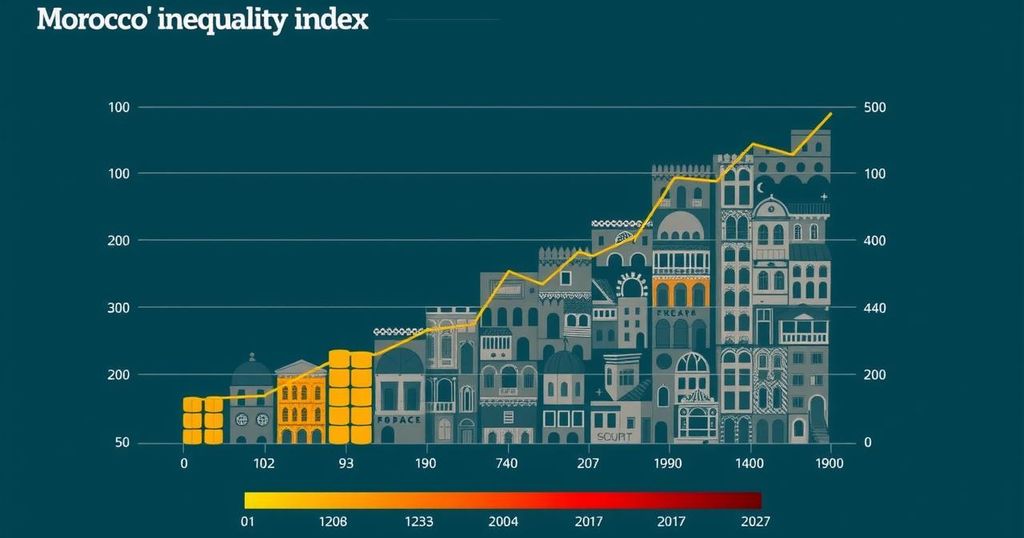Morocco has significantly improved its standing in the 2024 Commitment to Reducing Inequality Index, ranking 73rd globally and fifth in the Middle East and North Africa region. Following post-earthquake reconstruction efforts, it noted a remarkable rise attributed to increased public spending. Despite its progress, the report warns of the potential volatility of its ranking amid global trends toward economic inequality.
Morocco has achieved notable progress in the 2024 edition of the Commitment to Reducing Inequality Index, as reported by Oxfam and Development Finance International (DFI) on October 21, 2023. The index ranks 164 countries and regions based on their commitment to combating inequality, placing Morocco in 73rd position globally. This ranking positions Morocco as the fifth-best performing country in the Middle East and North Africa region, behind Israel, Jordan, Tunisia, and Algeria, while surpassing Palestine, Egypt, Iran, Djibouti, Yemen, Oman, Lebanon, Iraq, and Bahrain. In the context of lower-middle-income nations, Morocco ranks 11th, trailing Uzbekistan but ahead of countries including Bolivia, Egypt, Eswatini, and Honduras. Within the African continent, South Africa, Mauritius, and Lesotho lead the rankings. Globally, Norway holds the top position, followed by Canada, Australia, Germany, and Finland. The assessment was grounded on three key indices: public services, taxation, and labor. Morocco’s performance includes ranking 90th in public services, 97th in taxation, and notably 21st in labor. This remarkable progress, which has earned Morocco the title of the top riser in this edition of the index, is attributed to increased spending on post-earthquake relief and reconstruction efforts following the devastating earthquake in September 2023. This natural disaster resulted in nearly 3,000 casualties and displaced a significant number of individuals. The report commends Morocco’s upward movement by noting a +30 change from the 2022 index position, surpassing other notable risers such as Malaysia, Paraguay, Eswatini, Canada, Spain, Ecuador, Moldova, the Democratic Republic of Congo, and Hong Kong. However, it also cautions that Morocco and other top risers may not maintain their upward trajectory. “The top riser, Morocco, moved up 96 places due to large post-earthquake relief and reconstruction spending.” In addition to its overall ranking, Morocco is recognized as one of the top 10 spenders in education, reflecting a 17% increase in the budget allocated specifically for this sector. Much of the educational funding is directed toward rebuilding schools devastated by the earthquake; it also includes initiatives aimed at promoting equity, such as the provision of free school meals and early education programs designed to address extreme inequality within Morocco’s education system. The global context painted by the report reveals a troubling trend, asserting that nine out of ten countries are adopting policies that exacerbate economic inequality. Furthermore, it highlights that a staggering 94% of countries receiving loans from the World Bank and the International Monetary Fund have reduced essential investments in public education, healthcare, and social safety nets over recent years, with 95% of International Development Association (IDA) countries making such cuts.
The Commitment to Reducing Inequality Index provides critical insights into the effectiveness of government policies in addressing socioeconomic disparities. The 2024 edition highlights the efforts of various countries, especially in the aftermath of crises such as natural disasters. Morocco’s substantial rise in the index is particularly noteworthy as it reflects the impact of significant reconstruction spending in response to the September 2023 earthquake. This context is essential for understanding both the challenges and opportunities faced by Morocco in its quest to reduce inequality and improve public services, as well as to invest in education and labor.
In summary, Morocco’s elevation to the 73rd position in the 2024 Commitment to Reducing Inequality Index underscores the effectiveness of substantial post-earthquake spending in enhancing its socio-economic standing. While the progress achieved is commendable, concerns remain regarding the sustainability of this improvement in the face of global trends that favor increasing inequality. With continued investment in public services, taxation reforms, and labor opportunities, Morocco possesses the potential to further its commitment to equality and social justice.
Original Source: en.yabiladi.com






